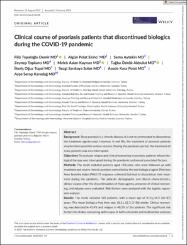| dc.contributor.author | Topaloğlu Demir, Filiz | |
| dc.contributor.author | Polat Ekinci, Algün | |
| dc.contributor.author | Aytekin, Sema | |
| dc.contributor.author | Topkarcı, Zeynep | |
| dc.contributor.author | Karadağ, Ayşe Serap | |
| dc.date.accessioned | 2023-01-30T11:35:13Z | |
| dc.date.available | 2023-01-30T11:35:13Z | |
| dc.date.issued | 2023 | en_US |
| dc.identifier.citation | Aytekin, S., Topkarcı, Z., Topal, O., & Karadağ, A. S. (2023). Clinical course of psoriasis patients that discontinued biologics during the COVID-19 pandemic. Journal of Cosmetic Dermatology. | en_US |
| dc.identifier.issn | 1473-2130 | |
| dc.identifier.uri | https://doi.org/10.1111/jocd.15638 | |
| dc.identifier.uri | https://hdl.handle.net/20.500.12294/3193 | |
| dc.description.abstract | Background: Since psoriasis is a chronic disease, it is not recommended to discontinue the treatment agents used. However, in real life, the treatment of psoriasis patients may be interrupted for various reasons. During the pandemic period, the treatment of many patients was also interrupted. Objectives: To evaluate relapse and clinical worsening in psoriasis patients whose biological therapy was interrupted during the pandemic and reveal associated factors. Methods: The study included patients aged ≥18 years, who were followed up with moderate and severe chronic psoriasis controlled by the last biological agent [Psoriasis Area Severity Index (PASI) 75 response achieved] but had to discontinue their treatment during the pandemic. The patients' demographic and clinical characteristics, clinical course after the discontinuation of these agents, presence of clinical worsening, and relapse were evaluated. Risk factors were analyzed with the logistic regression analysis. Results: The study included 169 patients, with a mean age of 47.3 ± 14.5 (18–87) years. The mean biologics-free time was 18.2 ± 12.3 (2–56) weeks. Clinical worsening was detected in 41.4% and relapse in 48.5% of the patients. The significant risk factors for clinical worsening and relapse in both univariate and multivariate analyses were alcohol use during the biologics-free period, total time off biologics, and the presence of an additional triggering factor. The use of secukinumab and ustekinumab was found to be a protective factor against clinical worsening in multivariate analyses. Conclusion: As the biologics-free period is prolonged, the likelihood of clinical worsening and relapse increases, therefore, we do not recommend discontinuing biological agents. © 2023 The Authors. Journal of Cosmetic Dermatology published by Wiley Periodicals LLC. | en_US |
| dc.language.iso | eng | en_US |
| dc.publisher | John Wiley and Sons Inc | en_US |
| dc.relation.ispartof | Journal of Cosmetic Dermatology | en_US |
| dc.identifier.doi | 10.1111/jocd.15638 | en_US |
| dc.rights | info:eu-repo/semantics/openAccess | en_US |
| dc.subject | Medical Therapy | en_US |
| dc.subject | Psoriasis | en_US |
| dc.subject | Treatment | en_US |
| dc.title | Clinical course of psoriasis patients that discontinued biologics during the COVID-19 pandemic | en_US |
| dc.type | article | en_US |
| dc.department | Tıp Fakültesi, Dahili Tip Bilimleri | en_US |
| dc.authorid | 0000-0003-4333-8274 | en_US |
| dc.relation.publicationcategory | Makale - Uluslararası Hakemli Dergi - Kurum Öğretim Elemanı | en_US |
| dc.institutionauthor | Karadağ, Ayşe Serap | |
| dc.authorscopusid | 26425048800 | en_US |
| dc.identifier.scopus | 2-s2.0-85146251492 | en_US |
| dc.identifier.pmid | 36630728 | en_US |


















